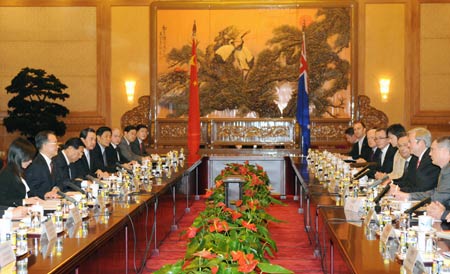
Chinese Premier Wen Jiabao (2nd L) holds talks with visiting Australian Prime Minister Kevin Rudd (2nd R) at the Great Hall of the People in Beijing, capital of China, on April 10, 2008.
The two sides also issued a joint statement yesterday agreeing to step up negotiations to meet the obligations included in the Bali Roadmap and to cooperate on clean coal technology, renewable energy, agriculture and other areas.
Rudd reaffirmed in the statement his promise to devote $20 million Australian dollars ($18.7 million) to a bilateral clean coal technology program.
Australia is the world's largest coal producer, while China is the largest coal consumer.
Tibet remained a sticky issue between the two sides.
Rudd said in a speech at Peking University on Tuesday that he would have a straightforward discussion on Tibet with Chinese leaders "as a long-standing friend to China".
In yesterday's talks, Wen briefed him on economic developments, human rights and culture in Tibet.
However, at a press conference later yesterday, Rudd reiterated his concerns about alleged human rights problems in Tibet.
Meanwhile, he said Australia recognizes China's sovereignty over Tibet and opposes boycotting the Beijing Olympics.
"Kevin Rudd's position on Tibet is basically the same as that of many Western countries, but his rhetoric is more tactful and less nasty," Zhang Jie, an associate researcher of Asia-Pacific studies at the Chinese Academy of Social Sciences, said.
"Although Rudd speaks Chinese, his position on Tibet is different from China's."
(China Daily April 11, 2008)